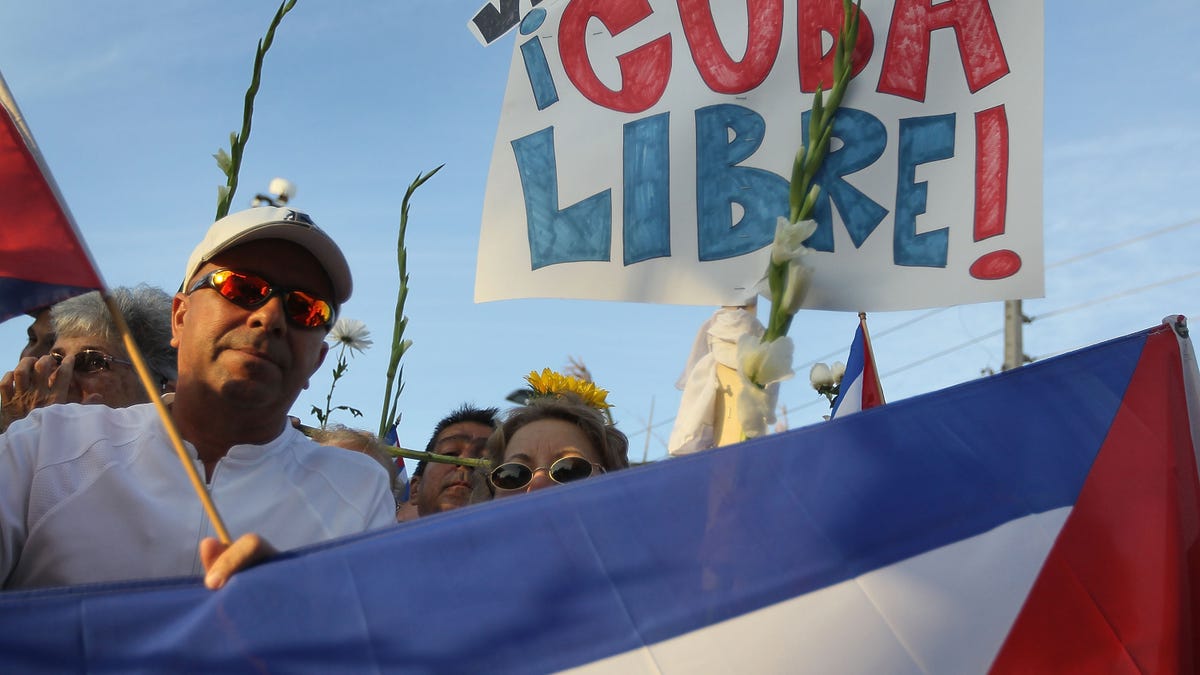
People show their support for an activist group in Cuba. (2010 Getty Images)
In the first discussion on the sensitive topic of human rights, U.S. and Cuban officials met in Washington D.C. Tuesday.
The discussion, proposed by Cuba, according to The Miami Herald, was expected to center on how to deal with the topic, on which both nations hold polar opposite views.
A Cuban delegate to talks with the United States says the two sides have held "a respectful, professional, civilized conversation" on human rights in Washington.
But Anaysansi Rodriguez Camejo, Cuba's ambassador to the U.N. in Geneva, told Cuban state television that Tuesday's talks "ratified that there are differences," according to the Associated Press.
Neither side gave details of Tuesday's session.
The U.S. was expected to press Cuba to allow its citizens greater freedom of speech, assembly and political activity. Cuba has often criticized poverty, insufficient health-care coverage and excessive police force in the United States.
The discussions are part of a series of meeting that officials of both countries have held since both President Barack Obama and President Raul Castro announced a restoration of diplomatic ties.
“These talks are an indication of Cuba’s willingness to address any topic with the U.S., despite our differences, based on equality and reciprocity,” Pedro Luis Pedroso, Cuba’s Foreign Ministry deputy director for multilateral affairs and international law, told reporters in his nation, according to the Herald.
U.S. Assistant Secretary of State Roberta Jacobson said that human rights is the topic over which the United States and Cuba harbor “the most profound disagreement.”
"This preliminary meeting reflects our continued focus on human rights and democratic principles in Cuba," a State Department official said, speaking on condition of anonymity, according to Reuters. "Human rights are a priority."
The new relations between Cuba and the United States includes easing trade and travel restrictions, and establishing embassies on each other’s soil.
U.S. critics of the restored diplomatic ties say the Obama administration made too many concessions, while the Cuban government has made few meaningful ones, particularly in relation to human rights.
Cuban officials, in fact, have been defensive about the topic, saying that they will not tolerate outsiders intervening in Cuba’s affairs.
At a session of Cuba’s National Assembly last year, Raul Castro said: “We shouldn’t expect that in order for relations to improve with the United States, Cuba is renouncing the ideas for which we have fought for more than a century and for which our people have spilled so much blood and run such great risks.”
“We have always been willing to engage in respectful dialogue on equal terms to address any issues without a shadow over our independence and without renouncing a single one of our principles,” said Castro, according to the Herald. “In the same way that we’ve never proposed that the Unites States change its political system, we will demand respect for ours,”
Tom Malinowski, the State Department's assistant secretary for human rights and democracy, led the U.S. side in Tuesday’s talks. Pedro Luis Pedroso, deputy director of multilateral affairs and law at the ministry of foreign affairs, led the Cuban side.
Cuba has made changes in its handling of dissenters in recent years, according to Human Rights Watch, but oppression continues.
Prison sentences for opponents of the regime are not as long as they were, but the Castro government clearly has little tolerance for those who criticize it or push for human rights.
“Officials employ a range of tactics to punish dissent and instill fear in the public, including beatings, public acts of shaming, termination of employment, and threats of long-term imprisonment,” said a 2014 Human Rights Watch report. “Short-term arbitrary arrests have increased dramatically in recent years and routinely prevent human rights defenders, independent journalists, and others from gathering or moving about freely.”
Like us on Facebook




